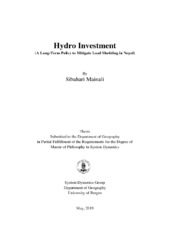| dc.description.abstract | Background: Nepal has been facing acute load shedding problem though it has a large potential for hydropower generations. It has more than 6,000 rivers with commercially exploitable hydropower generating potential of about 42 GW. However, till date, only 1 GW hydro capacity is on hand. Load shedding increased significantly over the past decade. It tripled from 490 GWh/year to 1,160 GWh/year even though the import of energy heavily increased from 356 GWh/year to 2,581 GWh/year. This load shedding has hindered overall economic growth of the nation. Several previous researchers concluded that the load shedding problem can be abolished with the dynamic pricing policy in short-run. They do not talk much about long-term solution. However, the hypothesis of this study is that the foreign direct investment (FDI) policy for deficit financing of hydropower projects can eradicate the capacity shortage, increase the electricity supply, and mitigates the load shedding problem in long-run. Method: Load shedding is a dynamic problem that requires analysis by dynamics models. Stella Architect software is used to analyze and find solutions to the problem. Results: The research concludes that at least 9% of the deficit financing must be covered by the foreign direct investment to increase the hydro capacity and electricity supply to mitigate load shedding over the policy period in future. The net present value (NPV) of profits of Nepal Electricity Authority (NEA), the organization with the full responsibility of the production and distribution of electricity in Nepal, with the FDI policy is almost doubled than without policy. Conclusion: The political leaders are believed to implement the FDI policy as the NPV of profits with the policy is higher than without policy even at constant price in the future. The study can be generalized to hydro industries seeking long-term solution of load shedding problem. | en_US |
